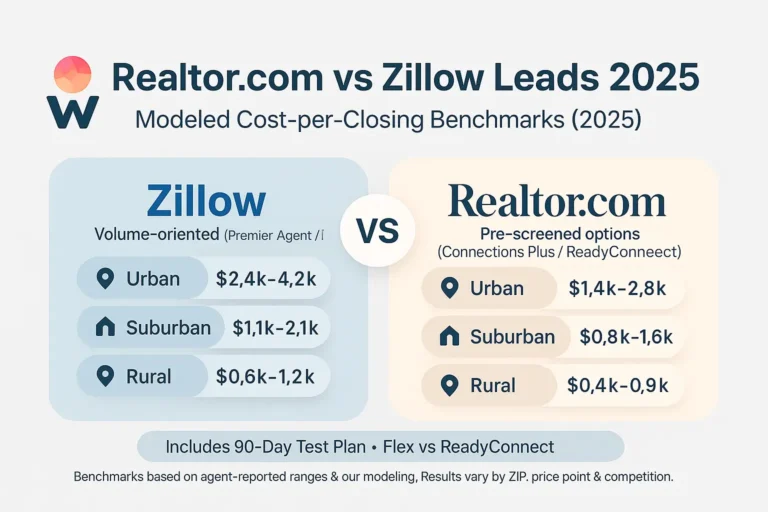The NYC Real Estate Agent’s Complete Tax Strategy Guide: Maximize Your Deductions in 2025
💸 Still losing thousands every year in taxes? Most NYC agents are — not because they’re doing something wrong, but because they’re not claiming everything they’re legally entitled to. Let’s fix that.
Working as a real estate agent in New York City means navigating one of the world’s most expensive real estate markets while juggling complex tax obligations across federal, state, and city levels. But here’s what many agents don’t realize: you’re sitting on a goldmine of tax deductions that can save you thousands of dollars every year.
Who This Guide Is For
This comprehensive guide is designed for:
- New and seasoned NYC real estate agents looking to maximize their deductions
- Independent brokers and team leads managing multiple income streams
- Anyone paying self-employment taxes and unsure if they’re missing legal deductions
- Agents transitioning from employee status to independent contractor
- Real estate professionals ready to take control of their tax strategy
After years of helping NYC real estate professionals optimize their tax strategies, I’ve seen agents transform their financial picture by properly claiming legitimate deductions. Some have saved $10,000 or more annually just by understanding what they’re entitled to claim.
This comprehensive guide will walk you through every deduction available to NYC real estate agents in 2025, complete with real-world examples and strategies I’ve developed working with hundreds of agents across all five boroughs.
Your Vehicle: The Hidden Tax Goldmine
🚗 💡 Quick Win: Track 15,000 miles and deduct up to $10,500 with standard mileage rates in 2025.
Let’s start with your biggest opportunity for savings. If you’re like most NYC agents, you spend significant time driving to showings, open houses, and client meetings — from Long Island City to Manhattan showings, Brooklyn open houses to Bronx listings. Every mile counts, and in 2025, each business mile is worth $0.70 in deductions.
The Numbers That Matter
The IRS increased the standard mileage rate to $0.70 per mile for 2025, up from $0.67 in 2024. For an agent driving 15,000 business miles annually (which is typical for active NYC agents), this translates to a $10,500 deduction. At a combined tax rate of 35%, you’re looking at $3,675 in tax savings just from tracking your mileage properly.
What Qualifies as Business Mileage
Every trip you make for business purposes counts, especially in NYC’s sprawling metropolitan area:
- Client showings and property inspections (Manhattan to Brooklyn and back)
- Open house visits across the five boroughs
- Meetings with mortgage brokers, attorneys, and inspectors
- Networking events and professional conferences
- Supply runs for marketing materials and signage
- Travel between your home office and temporary work locations
- Drives from your Queens home to show Staten Island properties
Pro Tip: The commute from your home to your main office doesn’t count as business mileage. However, if you work primarily from home and occasionally visit your brokerage office in Midtown, those trips become deductible business travel.
The Actual Expense Alternative
Sometimes the actual expense method works better than the standard mileage rate. This is particularly true if you have a newer, expensive vehicle with high monthly payments. Under this method, you deduct the business percentage of all vehicle expenses: gas, insurance, maintenance, repairs, and depreciation.
For example, if you use your car 80% for business and your total vehicle expenses are $12,000 annually, you can deduct $9,600. Compare this to the standard mileage deduction for your actual business miles driven to determine which method saves you more.
Maximizing Your Home Office in NYC’s Expensive Market
🏠 💡 Smart Move: A home office in a $4,000/month Manhattan apartment can save $7,000+ in taxes annually using the actual expense method.
In a city where every square foot costs a premium, your home office deduction becomes incredibly valuable. The simplified method allows you to deduct $5 per square foot for up to 300 square feet of dedicated business space, providing up to $1,500 in annual deductions.
Qualifying Your Home Office
Your home office must meet three strict criteria:
- Exclusive use: The space is used only for business
- Regular use: You conduct business activities there consistently
- Principal place of business: It’s your main business location
Here’s a crucial consideration for NYC agents: if you’re paying desk fees to a brokerage, you typically cannot also claim the home office deduction. However, there’s a strategic opportunity here. Calculate both deductions and choose the one that provides greater tax benefits.
The Actual Expense Method for Home Offices
If your dedicated home office space exceeds 300 square feet or you have significant home-related business expenses, consider the actual expense method. You can deduct the business percentage of mortgage interest, property taxes, utilities, insurance, and maintenance costs.
For a Manhattan agent with a $4,000 monthly mortgage using 15% of their apartment exclusively for business, the annual deduction could exceed $7,000.
Home Office Deduction Comparison: Which Method Saves You More?
| Method | Deduction Cap | Best For | Documentation Required | NYC Example |
|---|---|---|---|---|
| Simplified | $1,500 maximum | • Small office spaces (under 300 sq ft)<br>• Basic home setups<br>• Agents who want minimal paperwork | • Square footage measurement<br>• Proof of exclusive business use | 300 sq ft office in Queens apartment = $1,500 deduction |
| Actual Expense | No cap | • Large office spaces (300+ sq ft)<br>• High-cost NYC apartments<br>• Significant home business expenses | • Detailed receipts for all home expenses<br>• Business use percentage calculation<br>• Annual expense tracking | 15% of $4,000/month Manhattan apartment = $7,200+ annual deduction |
Decision Tool: Calculate both methods annually and choose the higher deduction. Many NYC agents benefit more from the actual expense method due to high housing costs.
Professional Development That Pays for Itself
📚 💡 Tax-Free Growth: Every dollar spent on legitimate professional development reduces your taxable income dollar for dollar.
Your investment in professional growth creates valuable tax deductions while advancing your career. Every dollar spent on legitimate professional development reduces your taxable income dollar for dollar.
Fully Deductible Professional Expenses
- Real estate license renewal fees
- NAR membership dues (minus the non-deductible lobbying portion)
- MLS access fees
- Continuing education beyond state minimums
- Professional conferences and seminars
- Real estate designations (CRS, GRI, ABR, etc.)
- Industry publications and subscriptions
Strategic Insight: While pre-licensing education isn’t deductible (it qualifies you for a new profession), all continuing education and professional development after becoming licensed is fully deductible.
Marketing Expenses: Building Your Brand Tax-Efficiently
📈 💡 Brand Builder: A $5,000 marketing campaign that generates $50,000 in commissions provides both business growth and a valuable tax deduction.
In NYC’s competitive market, marketing isn’t optional — whether you’re targeting Upper East Side luxury buyers or Queens first-time homebuyers. Fortunately, legitimate marketing expenses are 100% deductible, making your brand-building efforts more affordable.
Digital Marketing Deductions
- Google Ads and Facebook advertising campaigns
- Website development, hosting, and maintenance
- Email marketing platform subscriptions
- Social media management tools
- Online lead generation services
- Professional photography for listings
- Virtual tour creation costs
Traditional Marketing That Still Works
- Business cards, brochures, and flyers
- Property signage and directional signs
- Print advertising in local publications
- Promotional items featuring your business information
- Direct mail campaigns
- Professional staging for listings
Marketing Strategy Tip: Track your marketing ROI alongside tax benefits. A $5,000 marketing campaign that generates $50,000 in commissions provides both business growth and a valuable tax deduction.
The Self-Employment Tax Strategy
💰 💡 Instant Savings: Deduct 50% of your self-employment taxes automatically — that’s $11,475 back on $150,000 in income.
As a self-employed real estate agent, you pay 15.3% in self-employment taxes covering Social Security and Medicare. However, you can deduct 50% of what you pay in self-employment taxes, creating an immediate tax benefit.
Here’s how it works with real numbers:
- Net self-employment income: $150,000
- Self-employment tax: $22,950
- Deductible portion: $11,475
This deduction reduces your adjusted gross income, potentially qualifying you for additional tax benefits and phase-outs.
Commission Splits and Business Relationships
💼 💡 Full Deduction: Every commission dollar you pay to referral partners, team members, or service providers is 100% deductible.
Every commission dollar you pay to other professionals is fully deductible. This includes:
- Referral fees to other agents
- Commission splits with team members
- Payments to buyer’s agents when listing
- Transaction coordinator fees
- Administrative support costs
Documentation Requirement: Issue 1099 forms for any individual receiving $600 or more in commissions during the year. Maintain detailed records of all commission payments with proper business justification.
Insurance: Protecting Your Business and Your Taxes
Business insurance premiums are fully deductible and essential for protecting your real estate practice:
- Errors and Omissions (E&O) insurance
- General business liability coverage
- Commercial auto insurance (business portion)
- Business property insurance
Health Insurance Bonus: If you’re self-employed and not eligible for coverage through a spouse’s employer plan, health insurance premiums for you and your family are deductible above the line.
Technology Investments That Pay Tax Dividends
Modern real estate requires substantial technology investments. Fortunately, these are fully deductible:
- CRM software subscriptions
- Lead generation platforms
- Email marketing services
- Transaction management software
- Office equipment (computers, printers, phones)
- Cloud storage and backup services
- Professional software licenses
Section 179 Opportunity: Major equipment purchases can be fully expensed in the year of purchase under Section 179, rather than depreciated over several years.
Business Meals and Client Entertainment
Business meals with clients, prospects, or other professionals are 50% deductible when they serve a legitimate business purpose:
- Client appreciation dinners
- Networking lunches with other agents
- Meals during business travel
- Open house refreshments
Documentation Requirements: Record the business purpose, attendees, date, location, and amount for each meal. A simple note on the receipt stating “Discussed listing strategy with potential seller John Smith” satisfies IRS requirements.
Advanced Strategies for High-Earning Agents
Real Estate Professional Status
Agents who also invest in rental properties may qualify for Real Estate Professional Status (REPS), allowing rental losses to offset commission income. Requirements include:
- More than 750 hours annually in real estate activities
- Real estate activities comprising more than 50% of working hours
- Material participation in rental property management
S-Corporation Election Benefits
Agents earning $75,000+ annually often save thousands by electing S-Corporation status. This strategy splits income between salary (subject to payroll taxes) and distributions (not subject to self-employment tax).
Example: An agent earning $200,000 might pay themselves a $100,000 salary and take $100,000 in distributions, saving approximately $7,650 in self-employment taxes annually.
NYC-Specific Tax Considerations
State and Local Tax Strategy
New York’s tax landscape creates unique opportunities:
- The federal SALT deduction remains capped at $10,000
- New York State allows separate itemization regardless of federal choices
- NYC agents may benefit from strategic timing of state and local tax payments
Quarterly Estimated Tax Management
Self-employed agents must make quarterly estimated payments:
- Q1 2025: April 15, 2025
- Q2 2025: June 16, 2025
- Q3 2025: September 15, 2025
- Q4 2025: January 15, 2026
Cash Flow Tip: Set aside 30-35% of net income for taxes to avoid year-end surprises and penalties.
Record Keeping That Protects Your Deductions
The IRS requires maintaining business records for three to seven years. Essential documentation includes:
- Detailed mileage logs with business purposes
- Receipts for all business expenses
- Commission statements and 1099 forms
- Bank statements for dedicated business accounts
- Home office usage documentation
Technology Solution: Use apps like MileIQ for automatic mileage tracking and cloud-based receipt storage to simplify compliance.
Strategic Tax Planning for Maximum Savings
Retirement Contributions
Maximize retirement savings while reducing current taxes:
- Solo 401(k): $23,500 employee contribution plus employer match in 2025
- SEP-IRA: Up to 25% of net self-employment earnings
- Additional $7,500 catch-up contribution if age 50+
Income and Expense Timing
Strategic timing of commission receipts and expense payments can optimize your tax liability across years, particularly beneficial when income varies significantly.
🚫 Top 5 Tax Mistakes NYC Agents Make
Avoid these costly errors that I see repeatedly across the five boroughs:
- Not tracking mileage from day one — Missing the standard mileage deduction costs agents thousands annually. That drive from your Astoria home to a Tribeca showing? It all adds up.
- Mixing business and personal bank accounts — This makes tax preparation nightmare and raises audit red flags. Open a dedicated business checking account immediately.
- Ignoring home office deductions — Whether you’re in a Studio City studio or a Park Slope brownstone, if you use space exclusively for business, you’re entitled to deductions.
- Forgetting to send 1099s to freelancers — Failing to issue required 1099 forms to photographers, stagers, or other contractors can result in penalties.
- Missing quarterly tax deadlines — Late payments result in penalties and interest. Set up automatic reminders for all four quarterly due dates.
FAQ Section
Q: I just started as a real estate agent. What’s the most important deduction to track from day one? A: Vehicle mileage is typically your largest deduction opportunity. Start tracking business miles immediately using a GPS-based app or detailed manual log. Even if you only drive 8,000 business miles in your first year, that’s $5,600 in deductions.
Q: Can I deduct my pre-licensing real estate course costs?
A: Unfortunately, no. Pre-licensing education helps you qualify for a new profession, making it a personal expense. However, all continuing education, professional development, and designation courses after becoming licensed are fully deductible.
Q: I work from home but also rent desk space at my brokerage. Which deduction is better?
A: You cannot claim both simultaneously. Calculate each deduction separately and choose the higher amount. If you pay $300 monthly in desk fees ($3,600 annually) but could claim $1,500 for home office space, the desk fees provide greater tax benefits.
Q: How much should I set aside for taxes as a new agent?
A: Plan to set aside 30-35% of your net income for combined federal, state, local, and self-employment taxes. This percentage may be higher if you’re in upper income brackets or have other income sources.
Q: Are my professional membership dues fully deductible?
A: Most are, but not entirely. Organizations like NAR allocate a portion of dues to lobbying activities, which aren’t deductible. NAR typically provides members with a statement showing the deductible portion, usually around 85-90% of total dues.
Q: Can I deduct business lunches with potential clients who don’t end up working with me?
A: Yes, as long as the meeting had a legitimate business purpose. The IRS doesn’t require successful outcomes, only that the meeting was conducted with the intention of generating business.
Q: What’s the difference between Section 179 and regular depreciation for equipment?
A: Section 179 allows you to deduct the full cost of qualifying business equipment in the year of purchase, rather than spreading the deduction over several years through depreciation. For 2025, you can expense up to $1,160,000 in qualifying equipment purchases.
Q: I drive a luxury vehicle. Does the type of car affect my mileage deduction?
A: Under the standard mileage method, the IRS rate is the same regardless of your vehicle type. However, if you have an expensive car with high operating costs, the actual expense method might provide larger deductions.
Q: Can I deduct my smartphone and monthly service if I use it for business?
A: Yes, but only the business portion. If you use your phone 70% for business, you can deduct 70% of the device cost and monthly service fees. Consider getting a separate business line for clearer documentation.
Q: What happens if I get audited and don’t have proper documentation?
A: The IRS may disallow deductions without proper substantiation, resulting in additional taxes, interest, and penalties. This is why maintaining detailed, contemporaneous records is crucial. Digital tools can help automate this process.
Q: Are there any clothing expenses I can deduct as a real estate agent?
A: Generally, no. Business attire suitable for everyday wear isn’t deductible, even expensive suits or designer clothes. Only clothing with your business logo that isn’t suitable for regular wear qualifies for deduction.
Q: How do I handle commission payments when I’m part of a team?
A: Report your gross commission income, then deduct amounts paid to team members as business expenses. Issue 1099 forms to team members receiving $600 or more annually, and maintain detailed records of all splits.
Q: Can I deduct client gifts during the holidays?
A: Yes, but with limits. Client gifts are deductible up to $25 per person per year. However, promotional items featuring your business name and contact information don’t count toward this limit and are fully deductible regardless of value.
Q: What’s the best business structure for tax purposes?
A: It depends on your income level and business goals. Sole proprietorship is simplest for new agents, while S-Corporation election can save significant self-employment taxes for higher earners. Limited Liability Companies (LLCs) offer liability protection with tax flexibility. Consult with a tax professional to determine the best structure for your situation.
Q: How do I track mileage when I make multiple stops in one trip?
A: Log each business destination separately. For example, if you drive from home to a listing appointment, then to a showing, then back home, you’d record the total mileage for the entire trip as business mileage since each stop was business-related.
Understanding and implementing these tax strategies can transform your real estate business’s profitability. The key is consistent tracking, proper documentation, and strategic planning throughout the year, not just at tax time. Consider working with a tax professional who specializes in real estate to ensure you’re maximizing every available opportunity while remaining compliant with all tax obligations.
By taking advantage of these deductions and strategies, NYC real estate agents can significantly reduce their tax burden and keep more of their hard-earned commissions working for them. The time invested in proper tax planning and record-keeping pays dividends far beyond the effort required.







